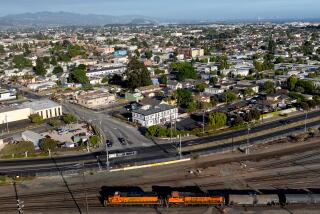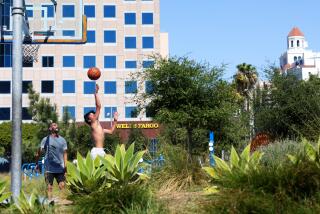The Herald Is 5 Years Gone, yet the Stories Live On
- Share via
“It really didn’t die, did it?” said Max McCrohon, the last editor of the Los Angeles Herald Examiner, as he looked around at the 150-plus old Herald hands who were gathered to remember the newspaper that had been so much a part of their lives, and the life of Los Angeles.
It was the same sort of comment you heard five years ago last week, on the night the Herald closed down, about how the Herald really wasn’t dead, that its spirit would live on.
The death of the Herald cost L.A. a piece of itself, the last of its old-style, screaming-headline, kick-out-the-jams newspapers. Ever since 1903, when press baron William Randolph Hearst blew into town and created what he called “an American paper for the American home,” the Herald Examiner and its precursors had chronicled--no, Heralded!--the tumultuous history of the city, story by story.
At its height, the Herald was the biggest afternoon paper in the country, cranking out a million copies a day in 12 frantic editions. At its ebb, after a brutal 10-year strike that began in the late 1960s, it was a financially ailing but editorially feisty morning daily known for its “second-coming” headlines: “WOW!” for the 1984 Olympics opening ceremonies, “LAKERS!” when Magic and Co. won the ’87 NBA championship, “GUILTY!” for the 1989 conviction of Richard Ramirez, a.k.a. the Night Stalker--a nickname invented, incidentally, by Herald City Editor Larry Burrough.
It was relentlessly local. Given a choice between a parliamentary shake-up in England and an escaped hippopotamus named Bubbles from a Southland wild animal park, the Herald went with Bubbles every time.
It was a newspaper feared beyond its circulation numbers by a generation of L.A. politicians and officials, one of whom, then-Police Chief Daryl F. Gates, paid the Herald perhaps the ultimate compliment when he said its closing meant “one less pain in the posterior.”
When all that ended five years ago, it was nonetheless said by the newly unemployed Herald hands, as they gathered in the paper’s watering hole, Corky’s bar, that the Herald could never really be dead. Because the Herald was not just a printing press, a building and a fleet of circulation trucks. The Herald was people, newspaper people-- Herald people --and as long as those people were around, it would live on.
It was the sort of brave talk you might hear at a funeral, when people try to persuade themselves there really is a place in heaven for dear departed Uncle Harry.
Yet for a few hours Saturday afternoon it seemed true as the former Herald staffers gathered at the Hollywood Roosevelt Hotel to mark the fifth anniversary of the newspaper’s death.
“It’s been five years already?” said Ramon Munoz, who spent 20 years at the Herald Examiner, working in the production department. “I loved it there. I still miss it.”
“People have such great memories of the paper,” said McCrohon, who flew here from Washington to attend the reunion. “There was just such a great spirit there.”
“It was a place you went to kick up your heels and to shake people up,” said Jim Bellows, Herald editor from 1978 to 1981. “We had a great time.”
Hundreds of stories flew back and forth. There was the time in the early ‘80s when a Herald reporter was kidnaped while covering a story in South-Central Los Angeles and was later ransomed for $18 and a peanut butter and jelly sandwich. There was the time word came in that a window washer was dangling by one foot 18 stories above a Downtown sidewalk and an assistant city editor sent a cub reporter out to “try to get an interview with the guy before they reel him in.”
There was talk about the legendary figures in Herald history: The Chief himself, William Randolph Hearst, who fired editors almost nightly over the phone. And Aggie Underwood, the crusty, cigar-smoking woman who ramrodded the newsroom as city editor.
In the end, however, that was really all there were . . . just memories. The Los Angeles Herald Examiner was no longer alive.
But it didn’t die.
More to Read
Sign up for Essential California
The most important California stories and recommendations in your inbox every morning.
You may occasionally receive promotional content from the Los Angeles Times.









